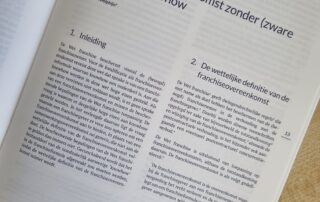Terms of payment
Franchisees and franchisors regularly send invoices to each other (and also to third parties). Unfortunately, especially in times of economic downturn, they are confronted with unpaid invoices. The European Directive 2011/7/EU to be discussed in this article (hereinafter referred to as: the Directive) deals with payment terms and aims to combat and reduce payment arrears in commercial transactions, to improve the competitiveness of companies and, finally, to improve the internal European market by reducing risks in cross-border transactions. This directive was finalized at the beginning of last year and must be implemented by 16 March 2016 at the latest. The aim of the directive is to supplement and/or improve the content of directive 2000/35/EC. This article will not discuss whether this has been successful, but will briefly discuss the substantive passages of the guideline that are important for (franchise) practice. Payment terms, etc. in the relationship between government and business are not considered in this article.
The provisions in the Directive apply to commercial transactions. The Directive defines a commercial transaction as a transaction leading to the supply of goods and services. Payment must be made for the provision of goods and services. In the franchise practice, many invoices are sent back and forth for the goods and/or services supplied. Therefore, the Directive applies to commercial transactions between the franchisor and the franchisee, but also between, for example, the franchisee and a third party, for example: a third party supplier or a consumer.
The Directive’s main means of achieving the above objectives is to create a right to interest if payment is not made within the payment term. The payment term can be a contractual or statutory payment term. The maximum interest that may be charged by the creditor in the event of a delay is determined in countries whose currency is the Euro by increasing the reference interest rate, which is set twice a year by the European Central Bank, by eight percentage points. .
When is the creditor allowed to charge his debtor interest? The debtor must be late in paying. Naturally, the cause of the delayed payment must be for the account and risk of the debtor. Therefore, a delay in payment attributable to the creditor will not create an authority for the creditor to charge interest to the debtor.
The debtor is late in paying if the payment term agreed between the parties has been exceeded. The directive stipulates that the payment term may not exceed sixty days, unless the parties have agreed otherwise and the creditor is not disadvantaged by this longer term.
A misconception in practice is that the creditor must send the debtor a written reminder or summons after the payment term has expired. Simply allowing the payment term agreed between the parties to expire is sufficient to be able to charge the interest. However, it should be clear to the debtor when he is late and will therefore owe interest. To avoid discussion about this, the parties must clearly agree on this and record it in writing, for example in the agreement or in the general terms and conditions. An indication of the payment term on the invoice is also an option.
What if the parties have not explicitly agreed on a payment term? In such a case, a period of thirty days applies. The directive stipulates that the aforementioned period starts a) on the day after the day the debtor has received the invoice, b) if the receipt of the invoice cannot be determined, on the day after the day of receipt of the goods or services, c) if the invoice is received before the goods or services, on the day after the day of receipt of the goods or services, d) if legal or contractual verification or acceptance of the invoice has been stipulated and the invoice is received on the day or before the verification, on the day after the day of receipt of the invoice.
In addition to charging interest, the creditor may also recover the reasonable costs involved in collecting his claim from the debtor, of course if these costs are related to the delayed payment. The directive has limited the amount of compensation that can be obtained. In practice, however, the provisions will often result in the creditor only being reimbursed a small part of the costs actually incurred.
All in all, not much will change in practice on many points and it is still preferable that the parties clearly agree with each other on the payment term to be used and the consequences of late payment.
Ludwig & Van Dam franchise attorneys, franchise legal advice

Other messages
Continued activities of the franchisee do not violate a non-competition clause
A judgment was recently rendered in preliminary relief proceedings in ...
Car dealer wrongly not a franchisee?
The Franchise Act entered into force on 1 January ...
Suspension of payouts allowed by the franchisor
The District Court of Limburg ruled on 30 March 2023, ...
Franchising is on the rise: ‘There is still a huge amount of room for it in the Netherlands’
An interview with mr. AW Dolphijn about franchise. De Beren, ...
The franchise agreement without (heavy demands on) know-how
In the 2023-1 edition of Contracting magazine, I published a ...
Standstill period violation
On 15 March 2023, the District Court of Noord-Holland, ECLI:NL:RBNHO:2023:2636, ...







